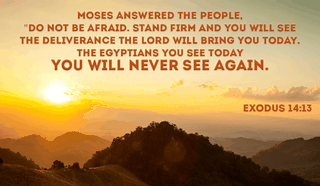
- Recent Translations
- All Translations
Esodo 14:28
Share
Settings
Esodo 14:28 Meaning and Commentary
And the waters returned
To their place, and so in the above tradition related by Diodorus Siculus, it is said that the sea returning with a mighty force was restored to its place again; (See Gill on Exodus 14:22).
and covered the chariots and the horsemen;
the wall they made being much higher than a man on horseback, when they fell down, covered even those who had the advantage of horses and chariots; and much more must the infantry be covered by them, who may be meant in the next clause:
and all the host of Pharaoh that came into the sea after them;
the foot, that went into the sea after the chariots and horsemen, or the whole army, including the cavalry and infantry, which went into the sea after the children of Israel. Who this Pharaoh was is not agreed; according to Berosus F24 his name was Cenchres, or Chenchres, whom Acherres succeeded; according to Bishop Usher F25 it was Amenophis; but our English poet F26 calls him Busiris; though Strabo F1 says there was no king or governor of that name. Diodorus Siculus F2 indeed speaks of two so called; yet he elsewhere F3 says, not that there was any king of the name, only the sepulchre of Osiris was so called:
there remained not so much as one of them;
wherefore it must be a falsehood which is related by some, that Pharaoh himself was preserved, and afterwards reigned in Nineveh F4, since not one was saved; see ( Psalms 106:11 ) and so Artapanus F5 the Heathen says, they all perished, and among these are said F6 to be Jannes and Jambres, the magicians of Egypt mentioned in ( 2 Timothy 3:8 ) but this is contradicted by those F7 who ascribe the making of the golden calf to them.
F24 Antiqu. l. 5. fol. 88. 2. & 90. 2.
F25 Annal. Vet. Test. p. 19.
F26 "-------whose waves o'erthrew Busiris, and his Memphian chivalry." Milton's Paradise Lost, B. 1. v. 306, 307.
F1 Geograph. l. 17. p. 552.
F2 Bibliothec. l. 1. p. 42.
F3 Bibliothec. l. 1. p. 79.
F4 Dibre Hayamim, fol. 13. 2.
F5 Ut supra. (Apud Euseb. Praepar. Evangel. l. 9. c. 27. p. 436.)
F6 Midrash in Exod. xv. 10. & Arab. MS. apud Gregory's Notes & Observ. p. 6.
F7 Shalshalet, fol. 7. 1.
